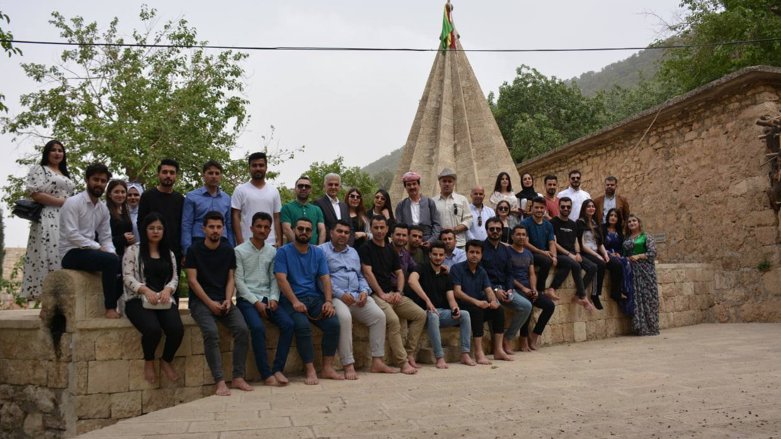Muslim students visit Yezidi Lalish Temple to counter stereotypes

ERBIL (Kurdistan 24) – Dr. Ibrahim Malazada, a Kurdish researcher and lecturer in sociology at Soran University, and a group of political sociology students visited Lalish Temple last spring, the holiest temple of the Yezidi faith, to break stereotypes.
They were introduced to the Yezidi culture and faith and guided through Lalish by Luqman Sulaiman, the media officer of the temple.
Read More: 366 candles lit in Lalish for Yezidi New Year
"The first plan was to go to a Christian village near Barzan, but most of them choose to go to Lalish," Malazada told Kurdistan 24.
"The majority of them loved to visit Lalish because there are too many wrong ideas about Yezidis," he said. "Even I got some answers to some questions (I had about the Yezidi faith). So it was a kind of surprise for me. And after the visit, students came to me and said it was amazing."
"After the visit, several students told me their perspective on the Yazidis had completely changed, and many things they thought about Yezidis were wrong."
"Their stereotypes about Yezidis have changed, and they do not talk about Yezidis anymore through stereotypes," he added. "One visit such as this is equal to 50 conferences because people practically see something and realize the reality, which is different from reading a book."
A number of Malazada's students work in the Asayish, police, and other government institutions.
"It was important for them because they are always working and are always in contact with people," he said.
Muslims have often held stereotypes about the non-Muslim Yezidi minority being impure or even alleged devil-worshippers.
At the end of the trip, students were assigned to prepare a report about their experiences.
Austrian expert on Kurdish and Yezidi affairs, Dr. Thomas Schmidinger, told Kurdistan 24 that some of these stereotypes which led to the ISIS genocide against the Yezidis in August 2014 existed before and are widespread among the Muslim population of the Kurdistan Region and the rest of Iraq.
Read More: Kurdistan PM addresses crimes against Yezidis on day honoring victims of genocide
"It is similar to the anti-semitism that already existed before the Nazis, and that was radicalized and systematized by the Nazis," he said.
He added that most Muslims do not eat food produced by Yezidis. As a result, one non-governmental organization had to stop a bakery project run by Yezidis.
"They were convinced that nobody would ever buy bread baked by Yezidis," Schmidinger said.
In a paper for the Kurdiname journal last year, Wojciech Kaczor, a postgraduate of the Institute of Oriental Studies Jagiellonian University, also wrote that the ritual of refraining from ablutions on the Yezidis sacred day of Red Wednesday also gave way to rumours of a general lack of hygiene among the religious minority.
"Another widespread stereotype is the idea that the Yezidis are devil-worshippers," Schmidinger added. "That is completely wrong and a complete misunderstanding of the Yezidi religion because for the Yezidis, something like the devil does not even exist."
The Yezidis worship the Peacock Angel that Muslims often wrongly conflate with the devil.
"They don't even have some concept of a personalized evil and hell, as they believe in a kind of transformation of the soul, and not in a final judgment that sends evil people to hell. They certainly don't worship the devil," Schmidinger concluded.
Murad Ismael, a Yezidi and the President and co-founder of the Sinjar Academy, told Kurdistan 24 that such visits to the Yezidi community and "direct interactions are necessary to bridge the gap and clarify misunderstandings which have been frankly the reasons for previous persecutions."
"For the Yazidis to live peacefully in the Muslim-majority world, these misunderstandings must be addressed," he said. "Co-existence can't be forced, but it is a culture that should be nurtured through genuine human connection and mutual respect for each other's beliefs."
However, he said Yezidis also have to do their part to "introduce their faith and not let radical views control the narrative, which has been the case historically."
